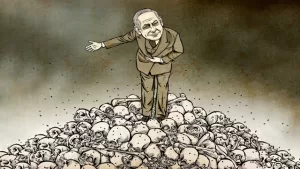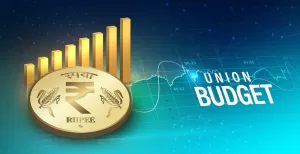Nepal is among the South Asian countries worst hit by the economic impact of the pandemic. The global rise in oil prices following the outbreak of a conflict in Ukraine has further worsened Nepal’s economic situation as the country imports all its oil. Nepal’s economy, like that of Sri Lanka, depends to a large extent on tourism and remittances from its citizens working abroad and in India. Nepal has not yet defaulted on its international debts as the government of Sri Lanka has. However, Nepal Rastra Bank (NRB), the country’s central bank, announced in early April that its foreign exchange reserves would last only up to the end of the year if the economic situation did not improve.
Speaking at a joint press conference in Kathmandu in the second week of April, Yuba Raj Khatiwada, Surendra Pandey and Bishnu Prasad Paudel, all former Finance Ministers of Nepal, warned that the country’s economy could go the Sri Lanka way if adequate measures to stem the slide were not taken immediately. Paudel said that the major economic indicators such as inflation, foreign currency reserves, trade deficit and balance of payments “are in a worrisome condition”. He accused the government of ignoring the situation.
Janardhan Sharma, the current Finance Minister, has claimed that the situation is not as dire as it is in Sri Lanka and that comparisons are unfair. He claimed that the national debt was lower than that of many other countries in the region. Nepal’s foreign currency reserves had fallen to $9.75 billion by the end of February. Remittances from overseas fell by around 6 per cent from July last year to February this year. The Asian Development Bank (ADB) said in April that Nepal’s debt had increased to 40.1 per cent of the gross domestic product (GDP) in 2021, from an average of 25.1 per cent between 2016 and 2019.
Increased spending during the pandemic was cited as the reason for the sharp rise of the debt last year. The ADB has predicted that Nepal’s current account deficit will widen to 9.7 per cent of the GDP in this fiscal year from 8 per cent last year. In the current fiscal year, the flow of foreign grants and loans has declined in comparison with previous years.
NRB Governor Maha Prasad Adhikari was suspended from his post in early April following allegations that he had leaked sensitive information. He was replaced by his deputy. The bank has increased interest rates in the hope that that will dissuade people from splurging on non-essential goods. The government in Kathmandu has imposed a ban on the import of cars, cosmetics and luxury goods.
Opposition party leaders have criticised the sacking of Adhikari. He was appointed to the post by former Prime Minister K.P. Sharma Oli. The current coalition government is led by Sher Bahadur Deuba, the Nepali Congress leader. Surendra Pandey, a former Finance Minister, Member of Parliament and a senior leader of the Communist Party of Nepal (Unified Marxist-Leninist), or CPN-UML, said that the sacked NRB Governor was “doing a good job and his removal at a time when the economic indicators are not good is a wrong decision”. Bishwambher Pyakurel, one of the country’s leading economists, said in a speech that the removal of the Governor at this juncture “is not good for the country’s financial stability”.
Prime Minister’s predicament
Deuba’s government is likely to face perilous times ahead. The new government was sworn in in August last year after the country’s Supreme Court intervened on the side of the country’s legislature and ruled that Oli’s attempts to stay in office were unconstitutional. The Oli government had lost its majority after a majority of CPN-UML legislators revolted against his “autocratic and erratic” leadership style. The political drama that took place in Nepal last year was eerily reminiscent to what transpired in Pakistan recently.
After Deuba was sworn in for an unprecedented fifth time as Prime Minster, it took him more than a month to cobble up a Cabinet. His own Nepali Congress party was not fully behind him. Many of Deuba’s senior colleagues blamed him for their party’s dismal performance in the last general elections. The Communists had won a two-thirds majority in Parliament.
In Nepal politics, most Prime Ministers lose their jobs because of inner-party revolts. The Oli government collapsed because he reneged on his promise to share power with senior party colleagues such as Pushpa Kumar Dahal (Prachanda) and Madhav Kumar Nepal. Prachanda and Nepal led the revolt that finally toppled Oli.
Deuba’s coalition partners in government are themselves disunited. The two main parties in the coalition government, the Communist Party of Nepal (Maoist Centre) headed by Dahal and the Janata Samajbhadi Party, are riven by factionalism. The government enjoys only a wafer-thin majority in Parliament. If the economy flounders further, the days of the Deuba government could be numbered. Political instability will further hobble chances for an early economic recovery.
U.S.’ game
In February this year, the Deuba government scored a political victory by getting Parliament to agree to the ratification of a controversial aid package from the United States, known as the Millennium Challenge Corporation (MCC). The Nepalese government formally accepted the $500 million grant from the U.S. government in 2017. The money was earmarked for infrastructure projects that were expected to help the country export hydroelectric power to India and build roads.
But after the Donald Trump administration intensified its anti-China moves in the region, the Left parties in Nepal’s Parliament began to have second thoughts about the U.S. offer. Senior U.S. officials, such as David J. Ranz, former Deputy Assistant Secretary for South Asia during the Trump administration, and the then Assistant Deputy Secretary of State, Alice Wells, tried to link it with the U.S.’ Indo-Pacific Strategy (IPS). The MCC concept has also figured in the annual U.S. National Security document since 2002. The importance of the MCC in the U.S. strategy for the region can be gauged by the fact that the Secretary of State is its chairman and the Treasury Secretary is its Vice Chairman. Almost all the political parties in Nepal had come to view the IPS as an anti-China enterprise. But in the end, most of the major stakeholders in Nepali politics had to accept the offer, albeit reluctantly.
When Parliament was preparing to ratify the agreement at the beginning of the year, big protests broke out in the capital, Kathmandu. Protesters even tried to break into Parliament. Many Maoist and Communist leaders began wavering on the issue. Many political analysts in Nepal are of the view that it was the MCC issue that precipitated a split among the communists. Oli, who at the time belonged to the CPN-UML along with Deuba, started speaking in favour of the MCC.
Prachanda and Madhav Nepal had become suspicious about the U.S.’ moves in the region, especially after the reactivation of the Quad security alliance. China, whose influence has grown dramatically in Nepal in the past two decades, is also worried about the growing U.S. military and diplomatic footprint in Nepal and the wider South Asian region. For that matter, India too will not be too happy to see the U.S. usurp India’s traditionally predominant position in Nepal. Suresh Chalise, a former Nepalese Ambassador to Washington, recently explained why his country could not afford to lose the U.S.’ trust. “Nepal needs support from countries like the U.S. as it is sandwiched between India and China,” he said.
Deuba finally succeeded in convincing most of his wavering allies to ratify the MCC in Parliament. Four of the five parties that are part of the coalition government voted for the ratification. The main opposition CPN-UML chose to abstain despite its vocal criticism of the MCC. The Joe Biden administration had threatened to withdraw the MCC if it was not ratified expeditiously. Donald Lu, the U.S. Assistant Secretary of State for South and Central Asia, had openly demanded that the leaders of the country’s main political parties ratify the MCC before February 28 or face a “review” of the U.S.’ relations with Nepal. The U.S. is Nepal’s biggest bilateral donor. With an economic crisis looming, Kathmandu could scarcely afford to alienate Washington.
Lu had personally delivered this message in separate phone calls to the Prime Minister, former Prime Minister Oli and Prachanda. The senior U.S. official had forwarded the message from the Biden administration that failure to ratify the MCC would lead to the curtailment of other forms of assistance, including from American aid agencies and private investments. According to reports, Lu expressed his dissatisfaction to the Nepali leaders about the alleged Chinese attempts to block the MCC. It was diplomatic arm-twisting of a sovereign country in broad daylight. The Chinese Foreign Ministry spokesperson described the U.S. move as “coercive diplomacy” and said that China opposed actions “that pursue a selfish agenda at the expense of Nepal’s sovereignty and interests”. The official emphasised that China offered aid to countries “without political conditions”.
Improved ties with India
After Deuba took over the premiership, relations with India have noticeably improved. The Nepali Congress is traditionally close to the Indian political establishment. Bilateral relations had become frosty after a minor border row erupted three years ago when Oli was at the helm of affairs. Oli had got the country’s constitution amended so that Kalapani, Limpiyadhura and Lipulekh could be included in the official map of Nepal. India has exercised control over the areas since Independence.
Deuba’s first visit after becoming Prime Minister again was to India. Traditionally, the first official visit Nepali Prime Ministers make is to India. Because of the pandemic, which severely impacted on both the countries, Deuba could only visit India in the first week of April this year. It was the first visit by a Nepali Prime Minster to India in four years. The unresolved border issue between the two countries came up for discussion during his meeting with Prime Minister Narendra Modi.
The Indian government has refused to receive a document prepared by an Eminent Persons Group (EPG), which consists of eight members, four each from India and Nepal. The EPG was set up in 2016 and was tasked with studying the outstanding issues that remain unresolved between the two countries and suggesting solutions. The EPG submitted its report in 2018. The Indian government has chosen to put it on the back burner.
A long-standing Nepali demand is for the amendment of the 1950 Treaty of Peace and Friendship between the two nations. The major political parties in Nepal consider it an unequal treaty. New Delhi has been dragging its feet on the issue. According to the media in Nepal, Deuba did not raise this issue during the official talks while in New Delhi. Deuba’s critics say that the government in Kathmandu has once again tilted towards India. In the last decade, Nepal had maintained a position of neutrality between its two powerful neighbours, India and China.
Deuba now has the dubious distinction of being the first Nepali Prime Minister to go to the headquarters of the Bharatiya Janata Party during his official visit to New Delhi. He did not bother to visit the Congress headquarters or meet with former Prime Ministers who are now in the opposition. Deuba also visited Varanasi where he met with Uttar Pradesh Chief Minister Adityanath. Varanasi is the most important place for pilgrimage for Nepalis outside their country. Varanasi is Modi’s parliamentary constituency. Religious revivalism is on the upsurge in Nepal aided by Hindu zealots from across the border. Adityanath has been saying that he wants Nepal to officially become a Hindu nation.
(John Cherian is a specialist in international relations, geopolitics and strategic affairs with a PhD from Jawaharlal Nehru University. Courtesy: Frontline Magazine.)




